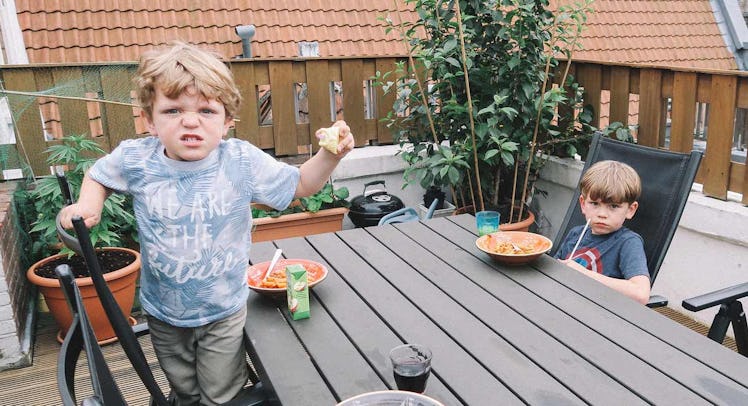Everything You Need To Know About Your Toddler’s Personality
Don't have a temperament tantrum

One of the things that makes humans incredible is their differences. There are people who like tea while others prefer coffee. There are people who are content to view the world through a veil darkness, while others crave happiness and light. Some humans want nothing more than to listen to really great music, and some prefer Smash Mouth. Clearly, it’s not only shooting stars that break the mold.
Many of these preferences are based on temperament. And interestingly that temperament can be recognized pretty early in your kid’s life. The bonus is that once you’ve figured it out, you might just have parenting insight that you can use forever.
Temperament In Brief
Temperament is an innate quality your kid is born with. It’s the essential part of their personality — the “themness” that rules how easily they will adapt to their environment and experiences. Temperament is what delineates the quiet kid from the one that will be Tarzan-ing the dining room chandelier.
During your kid’s formative years, temperament can shift a bit based on life experiences. But it’s generally solidified by the time they hit school. That’s a good thing, considering it helps people know who your kid is and what they can expect from them. Is it fart noises 24/7 or one who wants to silently flip through pictures books in a reading nook?
Temperament Traits
The way temperament is determined is by looking at specific characteristics your kid might display in their everyday life. Depending on what you’re reading you’ll find between 5 and 10 key traits that will help you understand who the heck they are:
- Activity Level: Do you have more of a manic Jim Carrey type or a stoic Michael Shannon?
- Adaptability: Can they roll with the punches — like when they find out you’re out of fruit punch?
- Approach/Withdrawal: Do they want to try new things, or think that’s a terrifying idea?
- Distractibility: Is your kid able to stay focu — SQUIRREL!
- Emotional Sensitivity: Do they get all the feels or feel nothing.
- Intensity: Are locked in a glass cage of emotions?
- Persistence: Will your kid just keep working on a boring sentence or will they just … Oh nevermind.
- Quality Of Mood: You got a ray of sunshine or a serious thundercloud?
- Regularity: Does your kid operate on a schedule or are they all over the place?
- Sensory Sensitivity: Do they dig Nirvana’s Bleach album? Or do they run and hide until you play some Elliott Smith?
Determining where your kid falls on these spectrums can help you create what’s essentially a bespoke parenting style just for them. You can do this all by yourself with minimal help from the internet, or you can take an online quiz to figure it out. Just like when you figured out how “pure” you were. You dirty bird.
The Big Three
Once you figure out where your kid is on the trait spectrums, throw them all together you’ll come up with a broad temperament profile. Child development psychologists generally agree on 3 broad, common profiles.
The Happy (Easy) Child
This is about 40 percent of kids out there in the world. Parent’s with these kids are a real pain in the ass to be around because they’re always saying crap like, “Oh, we never had that problem with Wesley.” And, oh, look at Wesley. You’d like to hate him for being such an amazing kid, but he’s just too damn easy going.
If your kid is an easy kid, you’ll notice that they’re cheerful, go-with-the-flow types who like new experiences. They dig new people, but still won’t take your crap. But no matter what, they’re pretty emotionally even keel.
The big issue with an easy kid is that they can be overlooked beside more emotional and difficult-to-manage kids. Don’t lose these kids to their own well-put-together world. They still need your attention too.
The Slow-To-Warm Child
These kids like to hang back. They can be pretty sensitive in the sensory arena. Even after the normal shy phase of babyhood, they’re still going to make uncle Terry feel like crap by not waving goodbye.
These kids don’t like change. They abhor rejection and they’re just generally more cautious when getting out into the world. They make up about 15 percent of kids in the wild.
If your kid is slow to warm, you’ll want to make sure you’re giving them plenty of time to figure stuff out. They’ll have to process quite a bit if Mighty Machines is removed from Netflix again. You need to give them a nice stable structure so they don’t fall apart.
The Wild Child
Nail everything down, because this kid will climb it, break it, throw it, yell at it and then cry about yelling at it. They are the ones you see going bat-poop bananas on the playground. They’re not that into focusing.
If you’re parenting one of these kids your prime directive is to GTFO of the house already. The more they run in circles in the yard screaming happily at the top of their lungs, the better it will be for everyone.
Of course it’s quite possible that none of these temperament profiles really fit your kid. That’s because everyone is different. But you knew that. However, using temperament traits can help you understand your kid better. If they’re not adaptable, you want to give them more time. If they’re highly active, you want to get them into something physical. In time you will have your style meshed to theirs, and suddenly everyone will be saying, “Hey now, you are an all star.”